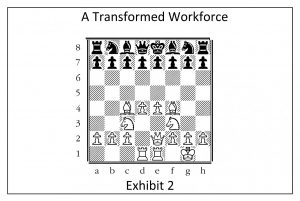Fear of the Unknown
One of the many concerns that business people have is fear of the unknown. How did that happen or how could I not see that was going to happen. Recently a friend of mine posted this picture on Facebook:

Whoops how did they not see that one coming? One liker said it reminded him of the MAD magazine fold-in and another liker said good thing the company name isn’t Farbucks.
A Model for Understanding the Unknown
In the conscious competency learning model, people who are unconscious incompetent means they are not aware that something even exists. Conscious incompetence means they know about it but they are really bad at it. Conscious competence means they know about something and if they try really hard they can pull it off. Unconscious competence means they have practiced something so much they can pull it off without even thinking about it.
In my business of developing talented people who want to become strategically stronger and tactically sharper leaders, people fall into three of the quadrants. Very few people are unconsciously incompetent who have never heard of “business” and even fewer have never heard of “chess.”
But they can fool themselves into believing what is important and what is not. I liken this to the story of the elephant in the room and the mouse in the corner.
When I talk with business people very few will ever admit they don’t know something about business. For example I don’t know how many times I have heard someone ask, “What is your ROI on that project?” Who would say: “I don’t know what you are talking about?” Yet if you drill down to see if they really understand what it means, unless you have some finance in your background it’s just a guess.
The same goes for other business knowledge.
- Do you know the four P’s of marketing and how they work together in a campaign?
- Do you know the five P’s of operations?
- Do you know four of the most common financial metrics used to evaluate return on potential projects?
- Do you know what a project is?
- Do you know what economic supply, demand, and equilibrium are?
- Do you know any leadership styles and how you use them appropriately?
- Do you know the four ways to manage risk?
- Do you know how to generate strategies and take advantage of tactical opportunities?
- Do you know how to engineer and manufacture solid formations on which to run a business?
And the list could go on and on…Any one of those areas represent the elephant in the room which if you don’t understand could do major damage to your business. It takes years of hard work and experience to become even consciously competent in those areas let alone proficient.
Yet, what people are worried about is the mouse in the corner called chess. I don’t know how to play or I do know how to play but am really bad at it. The truth is I can teach a kindergartner how to play chess in fifteen minutes. They may not be able to write their moves down but they can start moving their pieces just like an inexperienced boss does when they are charged with managing others.
That is the easy part, if you think of chess as a way to practice leadership, financial management, risk management, and employee development then the skills you develop during a game of chess transfer directly over to your work. Here is an example, which player do you think has been a better transformational leader of their chess piece/employees?

I once asked this question to a person in my class who admitted other than how to spell chess she knew nothing about the game. Which side would you rather play? She considered for a few seconds and said “White.” When I asked her why, she said: “I don’t know for sure, but it looks like White is up to something.” Her response was an insightful, intuitive response that demonstrated how one can shift from conscious incompetent to the conscious competent quadrant with one answer.
Yes, White is up to something and although they have not won the game, if Black is not careful their King is about to be run out of town in a hurry.
The benefit of reading Business on the Board is that all of this information is contained in one book. The elephant and the mouse are a masterful compilation of stories, case studies and games from my business management and tournament chess careers. The book will leave you strategically stronger and tactically sharper so you are better prepared to win the battles of business. Check out our website www.businessontheboard.com to find out where you can purchase the book.
Today the piece sitting next to the King and Queen is the Bishop, but that transformation occurred when the game arrived in Europe and began to be played by nobility. The elephant was considered the beast of war in India where chess originated. I still have students in my class say: “You need to move the elephant”, which totally confuses everyone else in the room. Who wants to deal with an angry elephant? Need some proof, I recently watched a video on the internet of 12 lions trying to take down an elephant. Who won? I’ll never tell.
This is a really awesome blog and is what I have been searching for. It has a lot of types of secrets I am always trying to find out extra information about. Many thanks for creating the site you did a great job and I am sure lots of people will enjoy it as well.